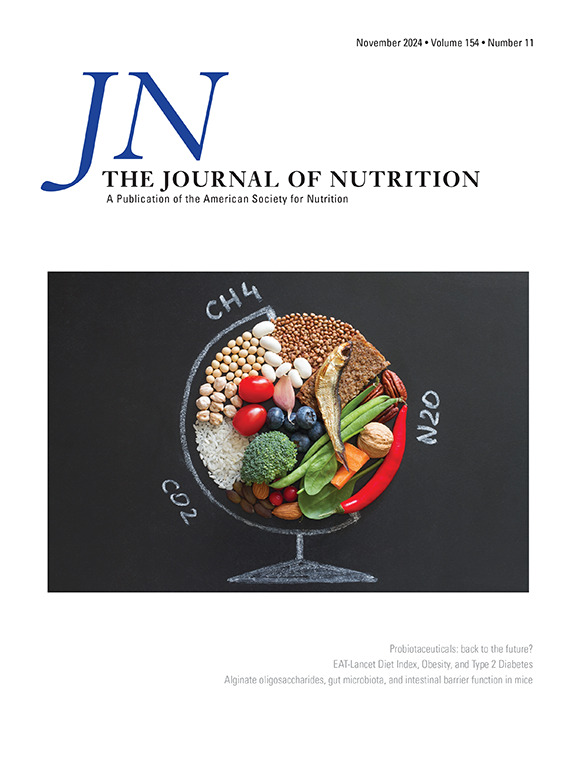Odd-Chain Fatty Acid-Enriched Fats Improve Growth and Intestinal Morphology and Function in Milk Replacer-Fed Piglets
IF 3.7
3区 医学
Q2 NUTRITION & DIETETICS
引用次数: 0
Abstract
Background
The intestinal development and nutritional needs of piglets after birth are similar to those of human infants.
Objectives
This study aimed to investigate the effect of different forms of odd-chain fatty acids (OCFAs) on the growth and intestinal morphology and function of milk replacer-fed piglets, as a model for human infants.
Methods
Forty 7-d-old piglets from 8 sows were randomly assigned into 5 groups (n = 8, each from a different litter) and fed sow milk or milk replacers supplemented with different kinds of fats (control fats, docosahexaenoic acid algal oil-, OCFA algal oil-, and OCFA-enriched fats) for 21 d. One-way analysis of variance was performed to compare the milk replacer-fed piglet groups, and unpaired t test was used to compare sow milk- and milk replacer-fed piglets.
Results
Milk replacers supplemented with OCFA-enriched fats increased the average daily gain (ADG), ratio of villus height to crypt depth, and protein expression of Ki67, phosphorylated (p)-mTOR, p-S6K1, Occludin, Claudin, and ZO-1 in the selected intestines of piglets and decreased the protein expression of p-ULK1, Parkin, and PINK1 to levels similar to those of the sow milk-fed group (P < 0.05).
Conclusion
Overall, milk replacers supplemented with OCFA-enriched fats improved the ADG and the intestinal morphology and function of piglets to levels comparable to those of the sow milk-fed piglets.
奇链脂肪酸富集脂肪促进了代乳仔猪的生长和肠道形态及功能。
背景:仔猪出生后的肠道发育和营养需求与人类婴儿相似。目的:以人类婴儿为模型,研究不同形式的奇链脂肪酸(OCFAs)对母乳喂养仔猪生长及肠道形态和功能的影响。方法:选取8头母猪的40头7日龄仔猪,随机分为5组(n = 8,每组来自不同窝次),分别饲喂添加不同脂肪(对照脂肪、DHA藻油-、OCFA藻油-和OCFA富集脂肪)的母猪乳或代乳21 d。采用单因素方差分析(one-way ANOVA)对代乳仔猪组数据进行统计分析。采用非配对t检验对母猪乳喂养和代乳喂养仔猪的数据进行分析。结果:添加ocfa富集脂肪的代乳粉提高了仔猪平均日增重(ADG)和绒毛高度/隐窝深度比,提高了所选肠道中Ki67、P - mtor、P - p70s6k、Occludin、Claudin和ZO-1蛋白的表达,降低了P - ulk1、Parkin和PINK1蛋白的表达,与母猪乳组相似(P < 0.05)。结论:总体而言,添加富含ocfa脂肪的代乳品能提高仔猪的平均日增重,改善肠道形态和功能,达到与母猪乳喂养仔猪相当的水平。
本文章由计算机程序翻译,如有差异,请以英文原文为准。
求助全文
约1分钟内获得全文
求助全文
来源期刊

Journal of Nutrition
医学-营养学
CiteScore
7.60
自引率
4.80%
发文量
260
审稿时长
39 days
期刊介绍:
The Journal of Nutrition (JN/J Nutr) publishes peer-reviewed original research papers covering all aspects of experimental nutrition in humans and other animal species; special articles such as reviews and biographies of prominent nutrition scientists; and issues, opinions, and commentaries on controversial issues in nutrition. Supplements are frequently published to provide extended discussion of topics of special interest.
 求助内容:
求助内容: 应助结果提醒方式:
应助结果提醒方式:


